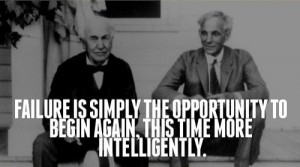There’s a thought-provoking article on failure in The Washington Post. Geoff Lewis, a venture capitalist, writes:
The understated acceptance of failure that propelled Silicon Valley for decades has morphed into something dangerous: failure porn. “Failure” as fast fashion, peddled by wildly successful people, packaged for mass consumption, that is no more reflective of real failure than commercially produced pornography is of real sex. People seem to forget that start-up founders can endure years of psychological trauma for naught, employees can lose their jobs, and investors can lose significant money. Rather than being a springboard to greatness, failure can simply be devastating.
Go ahead. Read it. I’ll wait.
What’s interesting is the author’s take on what is really a failure culture: this idea of expecting to screw up, often with someone else’s money, and then just moving on. It got me thinking about what’s wrong with this picture (and there’s a lot), and how it has distorted the costs and opportunities that come from failure.

Your business is not disposable.
If you’re not invested in the success of your business, then your business is unlikely to be successful. You have to buy into your idea, pour your heart and soul and sweat equity into building it, and motivate others to do the same. Failure culture ignores this. Take, for example, a woman I read about recently who calls herself a serial entrepreneur and brags that she’s on her third business. Great, but the first two failed and she has secured three years of financial support (e.g., someone else’s money) to try to make a go of business #3. Would you invest your time, money, or stress equity in her?
You have to understand the consequences of failure.
I occasionally watch Beyond Scared Straight, a show that follows at-risk teens as they get an inside look at life in prison. One of the big lessons that correctional staff try to drill into the kids’ heads is that their screw-up is hurting their families. It’s not just “Do not pass go–go directly to jail” but also the real-life emotional toll on those around you. Failure culture misses this point entirely. It celebrates the failure but fails to recognize the impact on other people’s lives.
You have to take responsibility.
There’s a theme in Washington right now around its highly dysfunctional NFL team: that its star quarterback thinks everyone else is to blame for the team’s failures. Now, I don’t know if this narrative is correct–but I’ve certainly never heard him point out anything he’s done wrong. You can’t learn anything if you don’t think anything is your fault.

You have to learn from what went wrong.
I’ve written before about the difference between failing and failure and how failure can be good for business. The theme in both is that you can’t be afraid of failure (or, as Lewis illustrates when talking about Proctor & Gamble, people will be paralyzed by the fear of making a mistake). It’s not about embracing failure; it’s about embracing the experience so you’re not doomed to repeat it.
I think Geoff Lewis nails the balance perfectly when he writes that America’s comparative advantage as “the best place in the world to build new things, to innovate, is inexorably linked to our collective attitude toward failure. We fear it enough to try very hard to succeed, yet not so much that we don’t attempt new things.” That is, I think, the perfect antithesis to failure culture.
Photos by Thomas Hawk, Kevin Dooley and Tatiana12.



